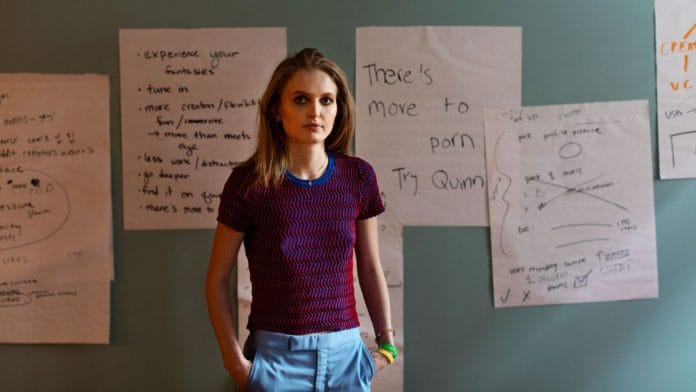New York: Caroline Spiegel isn’t afraid to talk about sex.
The 22 year-old entrepreneur and younger sister of Snap Inc. founder Evan Spiegel, has founded a startup called Quinn, a website for audio erotica.
Spiegel hopes Quinn, which is launching officially on Thursday, will become the go-to place for what she calls “the internet’s best-kept secret.” Quinn packages erotic stories and “guided masturbations” behind an interface as polished and minimalistic as any other startup geared toward Millennials, a stark difference from the pop-ups and animated ads often associated with sites like PornHub. In fact, there are no pictures or videos at all.
“Audio porn really gets at the sort of non-obvious intangible parts of sex that visual porn just doesn’t get at it in the same way,” Spiegel said.
Quinn is the latest addition to a growing adult podcast market. In the last five years, venture capital funds have plowed $1.6 billion into audio-tech companies, according to PitchBook, a category that includes hardware and software for the music and podcast industry. According to PricewaterhouseCoopers and the Interactive Advertising Bureau, the podcasting industry is expected to generate $679 million in revenue this year.
And while the numbers don’t break out adult content from general podcasts, it’s clear that the money-generating power and timeless popularity of romance novels has combined with the success of audio startups like Gimlet Media and Anchor to help spur interest in audio erotica.
One of the early leaders is Dipsea, an app-based platform for short-form erotic audio stories that has raised $5.5 million from Bedrock and Thrive Capital. A subscription service, Dipsea costs $5.99 a month and now ranks in the top 100 grossing entertainment apps, according to researcher App Annie. Other competitors include Bawdy Storytelling, a podcast featuring long form stories and Literotica, a site mostly known for its written stories, but which also hosts audio content.
During her junior year at Stanford University, Spiegel took time off to deal with an eating disorder. As she recovered and rediscovered her sexuality, she said she had a realization that fantasy and arousal “is easier for some people,” men specifically. So she set out to create a product for women and after doing some research settled on audio erotica.
The genre isn’t necessarily new. But while there is clearly demand, it has struggled to find the right distribution method. Free audio erotica of varying quality is available on Reddit, and Tumblr once had a robust library before the social media site banned pornographic content late last year.
Spiegel saw an opening. Quinn aims to host content, written and uploaded by voice-actors or writers, on a curated, social media-style platform. The site offers users three ways of participating: telling their stories, listening to others’ stories or reading erotic tales. Spiegel said she wants Quinn to not be too tightly curated or have “one voice,” so that everyone can find content that appeals to them. “We want to be a bazillion voices.”
To moderate the submissions, Quinn will have “really accurate tagging” so that listeners know what to expect from a story. The site does have a few strict rules, including that stories don’t involve minors or non-consensual acts, and it removes posts that don’t comply. The startup is still considering how it will make money, “because people are not prepared to pay for porn,” Spiegel said. Creators that post content to Quinn can make money by receiving tips from users.
In designing the site, Spiegel was conscious of how women are marketed to. “I feel like I’m always kind of being yelled at by products to Be Better! Prettier! Skinnier! More Athletic!” she said. One of the first tenets of marketing is to make a product aspirational, Spiegel said. “But Quinn is kind of like, no thanks to that,” she said. “We’re just trying to make you feel better about who you are already.”
Comedian and Quinn-user Remy Kassimir says video porn never appealed to her, since instead of erotic emotions, she’d feel a “nervous overdrive,” comparing herself to the cookie-cutter body types of many women in the videos. Audio erotica presents an alternative for people, especially women, to more comfortably explore their sexuality, she said.
Spiegel and her team also discovered, as the site went through beta testing, that almost half of the users were men. This surprise was counter to their initial theory that women were more drawn to audio erotica and men were more visual.
On a Monday morning a few weeks before Quinn’s official launch, Spiegel gathered the five-member team for a meeting at the company’s Brooklyn, New York, office. They congregated with laptops around a large wooden dining room table, with a bowl of Quinn-branded condoms as a centerpiece. The sunny loft space, with an industrial style kitchen and open floor plan, looks like any other startup office. But details, like a neon sign reading “XXX DVD Video” hanging on the exposed brick wall, and a faded Playboy from 1972 on the counter, wink at Quinn’s mission.
Spiegel declined to name investors in Quinn or say how much the startup has raised though she told Tech Crunch earlier this year that the site had brought in less than $1 million in outside capital.
Pitching a sex-tech product presents unique challenges, especially for female founders. “Obviously men are uncomfortable” during a graphic pitch with precise language, Spiegel said. “But they do take my meetings.”
Spiegel said audio erotica is popular because it evokes a sense of mystery and sensuality that video doesn’t.
“Everyone’s like, ‘Oh VR porn is the future and the more graphic, the more in-your-face kind of porn the better,’” Spiegel said. “Quinn is kind of a contrarian take. Human desire is more complicated and people want content they can really relate to, truly connect with.” -Bloomberg
Also read: Facebook, Instagram pulled millions of posts over child pornography, drug sales, terrorism






